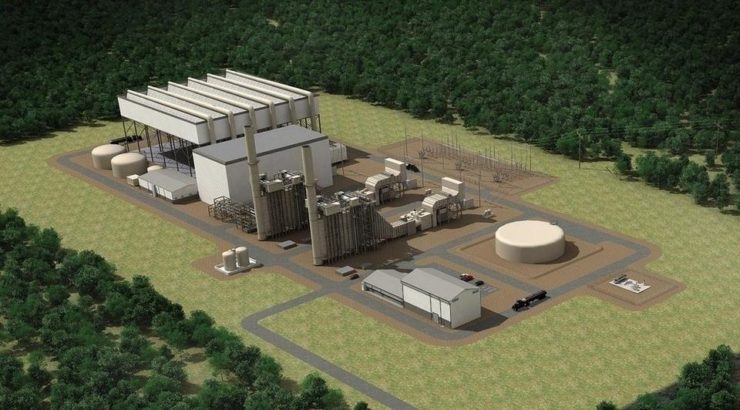Invenergy Power Plant Proposed For Burrillville DENIED By Energy Facilities Siting Board!
On October 29, 2015, Invenergy Thermal Development submitted an application to the Rhode Island Energy Facilities Siting Board (EFSB) to construct and operate the Clear River Energy Center, which was planned as an electric generating facility fueled by natural gas and diesel, to be located in Burrillville.
Finally after years of hearings that included a 2017 hearing in Charlestown, the EFSB ruled on Thursday, June 20, 2019 that Invenergy had failed to demonstrate that the 1,000-megawatt Clear River Energy Center is necessary and moved to deny the application.
Charlestown has been connected to the Invenergy power plant since they proposed taking water from groundwater we share with the Narragansett Tribe and area towns.
On September 28, 2017 Invenergy identified the wells of the Narragansett Indian Tribe as a source of water to cool the Power Plant’s turbines.
The water supply for Charlestown, including the Narragansett, is from a common aquifer located within the Pawcatuck River Basin. The public documents showed a range of 15,000 to 724,320 gallons per day would be needed. All water taken from the Narragansett wells would have been trucked from Charlestown to Burrillville in large tanker trucks.
The power plant was opposed by the Conservation Law Foundation, Save The Bay, The Nature Conservancy, and other environmental organizations and over 30 of Rhode Island’s cities and towns, including Charlestown.
Because of the threat to our local water supply and roads, on October 11, 2017 the Town of Charlestown filed a motion to intervene in the proceedings to review the application for the power plant, and On October 17, 2017 the Town was granted intervener status.
Although the government of the Narragansett Tribe signed the agreement to sell water, members of the Narragansett opposed the sale of water from their land and on October 20, 2017 the Narragansett Tribal Council filed a motion to intervene with the EFSB saying the agreement had not been signed with the consent of the Tribe.
Allowing Charlestown to intervene and an internal tribal disagreement over the sale of water from the aquifer caused an important delay in the hearing process and gave opponents of the power plant more time to gather the scientific and financial data needed to defeat the power plant.
In December 2017 a hearing on Invenergy’s plan to withdraw water from the Pawcatuck Watershed drew hundreds to the Charlestown Elementary School to testify against the proposal.
In January 2018, the water withdrawal contract between the Narragansett Indian Tribe and Invenergy was terminated and Charlestown lost its intervenor status as we were no longer considered an impacted town by the EFSB.
Many in Charlestown continued to have an interest in the power plant proposal because of its impact on an important wildlife corridor that connects Charlestown to Burrillville. Charlestown and Burrillville are connected by a corridor of Rhode Island’s most rural areas, with large tracts of contiguous forest, rivers, wetlands, and important wildlife and outdoor recreation areas. Charlestown’s natural resources are important, but that importance is greatly magnified by connecting our coastal conservation areas to northern forests.
The EFSB’s denial of the power plant is certainly a victory for Burrillville, the Conservation Law Foundation, the Rhode Island Chapter of The Nature Conservancy and others, but it is a victory for Charlestown too. The threat the power plant posed to our drinking water, roads, wetlands and other natural resources is now over and the opportunity to protect the wildlife corridor that connects the two towns is still a possibility.
There’s lots more about the Invenergy proposal to take our groundwater at our website.

June 24, 2019 @ 9:53 pm
One less nail in the carbon coffin! Horrah! Go Solar and Wind RI!
June 24, 2019 @ 11:57 am
Will the Charlestown town council communicate to the EFSB our appreciation of this decision?
June 22, 2019 @ 7:58 pm
I am a Burrillville guy through and through. And there’s nothing more that I love about our beautiful state than its western forest. As such, I am so grateful for the support given the anti-power plant cause—which is really RI’s “Save the Forest” cause—by the Charlestown Citizen’s Alliance.
Your response in the case was fabulous, especially when the power company, on the advice of who?—-made its secret pact to supply water to the plant with two members of the Narragansett People purporting to be its leadership.
The public hearing that resulted in Charlestown was marvelous; the participants so well prepared, on point, and articulate. The fiasco of the “Narragansett Water Deal” exposed the company to the derision of the entire state. No longer were Invenergy’s claims on any score thereafter guilded with a patina of competent authority.
It has been said from time to time in your pages that an alliance ought to be formed of all the towns up and down the North-South trail to protect Little Rhody’s Great Western Forest, or “Canangogum,” as the Natives once called it. The Nature Conservancy attempted to do that a decade ago, but the effort fizzled. But with this power plant battle putting the stakes involved in such stark relief, I hope the idea can be revived and come to fruition one day. The idea is certainly alive at the top and bottom borders of the satellite photograph of the region.
Again, many thanks from citizens all over the state for your help in this cause.
Bravo!